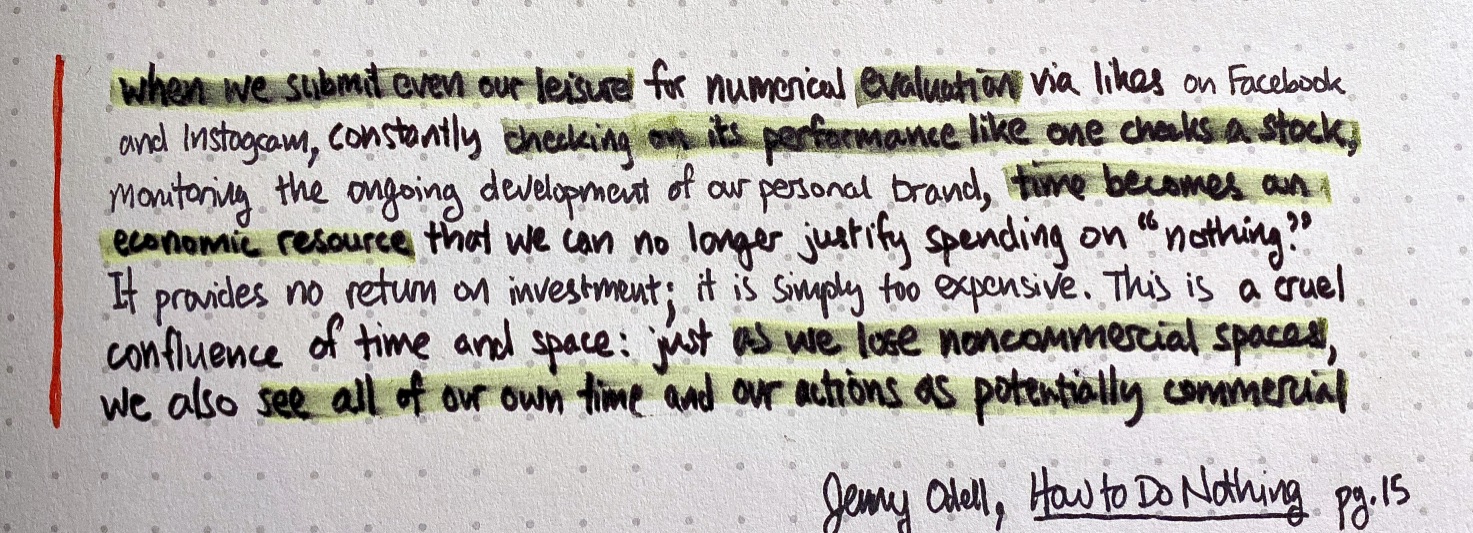Relearning to Be Lost
Dave here. The newsletter has been quiet, but behind the scenes at The Marginalia Club we were flooded with so much good stuff that it was hard to decide what to share with y’all.
In How to Do Nothing, Jenny Odell points the finger to social media for infilitrating our leisure time with market thinking.
[…] when we submit even our leisure for numerical evaluation via likes on Facebook and Instagram, constantly checking on its performance like one checks a stock, monitoring the ongoing development of our personal brand, time becomes an economic resource that we can no longer justify spending on “nothing.” It provides no return on investment; it is simply too expensive. This is a cruel confluence of time and space: just as we lose noncommercial spaces, we also see all of our own time and our actions as potentially commercial

This was a completely rad book overall, by the way. Odell has some critical things to say about social media and the attention economy, but is more interested in practicing attention at a variety of scales than retreating from the Internet wholesale.
Her Twitter feed is a pretty good mix of birds, book quotes, and photos of everyday weirdness.
Do I check my Twitter notifications like I’m monitoring a stock price? Sometimes, yes, it feels that way. I tweet something and I find myself wondering “COME ON, WHO THOUGHT THAT WAS FUNNY?!”
Twitter is great for riffing on an idea with an interesting cross-section of folks, but for my own sanity I have to write my threads and then walk away. It helps that I’ve blocked Twitter from my phone. I can write, then take my son to the playground and play tag while the craving for approval fades.
Social media may add a feedback loop for measuring our free time, but George Lakoff points to industrial society writ large for our anxiety about time (Metaphors We Live By, 1980):
In our culture TIME IS MONEY in many ways: telephone message units, hourly wages, hotel room rates, yearly budgets, interest on loans, and paying your debt to society by “serving time.” These practices are relatively new in the history of the human race, and by no means do they exist in all cultures. They have arisen in modern industrialized societies and structure our basic everyday activities in a very profound way. Corresponding to the fact that we act as if time is a valuable commodity—a limited resource, even money—we conceive of time that way. Thus we understand and experience time as the kind of thing that can be spent, wasted, budgeted, invested wisely or poorly, saved, or squandered.
When I was teenager, time felt as wide open as the fields around my house. I could lose myself in a book for hours at a time without any anxiety about what I was missing.

My backyard when I was a teenager.
That’s changed as I’ve aged, but is it because I joined Twitter or because I have kids and a full-time job? Probably a bit of both. Now more than ever, one of the central tasks of adulting is relearning to lose oneself in time, from time to time.
On that note, I’m going to go read a novel on the couch while the kids play. I’ve just started Murakami’s Killing Commendatore, whose protagonist (a painter) observes the importance of concrete detail to seed his work:
If I did it that way, the work completed itself. But now I couldn’t see anything that would provide the initial spark. You can have all the desire and ache inside you want, but what you really need is a concrete starting point.
Thanks for reading. Now go waste some time; you need it.